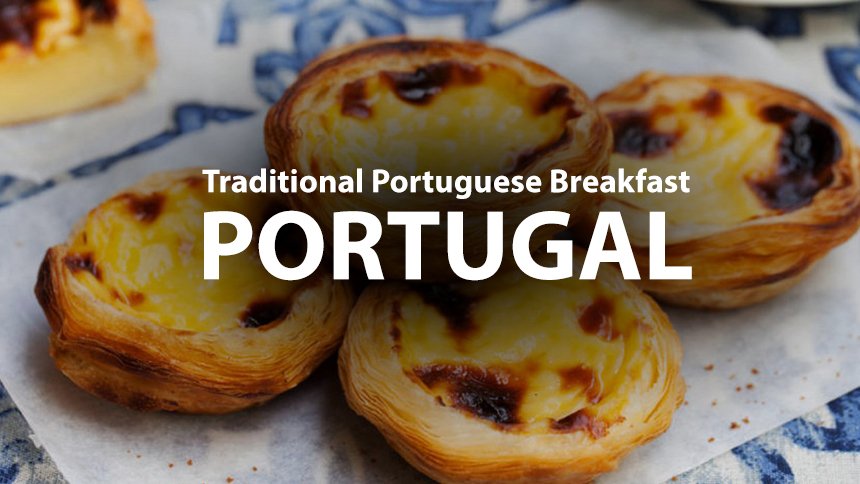Are you in Portugal and wondering what a traditional Portuguese breakfast includes and what you should order? While you are breathing the air of Portugal, you may want to experience the rich local culture and consume local food, which is quite understandable.
However, you might be scratching your head over what to order for your breakfast to get an authentic Portuguese experience. While it is pretty hard to decide on what to eat from the menu, we are here to help you in this crisis.
This blog provides a deep insight into traditional Portuguese breakfast. It discovers the most common Portuguese breakfast items that you must try while you are still in Portugal. Stick around and find yourself an array of options that you can take as traditional Portuguese breakfast.
What do the Portuguese Traditionally Eat?
Although there is nothing special or as unique that Portuguese typically eat as their breakfast, there are some common items that play their role as the ingredient of Portuguese breakfast. Here are some of the most common ingredients of traditional Portuguese Breakfast:
- Bread
- Sliced Ham
- Sliced Cheese
- Jam
- A mug of milky coffee.
Sometimes, people might casually take toast without the ham and cheese as their breakfast. However, the most common items that rule breakfast are bread and a mug of milky coffee, which is locally termed galao or meia de leite.
Speaking of bread, it can come in different shapes. For instance, one might use sliced bread, toasted bread or a bread roll in their breakfast. Furthermore, some may also consume crosisant as their breakfast.
On the other hand, you will always find cheese and ham in a single format which is sliced flamengo cheese which is Edam cheese and sliced ham. Other than these, you won’t find any options in terms of cheese and ham.
Although Portugal fosters cultural diversity with the change of geography the traditional Portuguese usually consists of the above-mentioned ingredients. However, you may also get cereals like muesli and diluted juice or squash at different restaurants in Portugal.
What does a Traditional Portuguese Breakfast Include?
Speaking of the traditional Portuguese breakfast might include items like coffee, bread, sandwiches, etc. If you want to get a rich cultural experience during your stay in Portugal, you can order the following items as your breakfast:
Coffee
Although espresso is a profound favorite of the Portuguese, the locals prefer to drink milky coffee in the morning as their breakfast drink. Two of the most commonly used drinks in the morning in traditional Portuguese breakfast are galao and a meia de leite. Here is a list of other coffee types that are commonly taken in the morning:
On the other hand, you may find people taking shots of beer before they are set for intensely muscular labor. Furthermore, you may find older men taking shots of brandy in their morning coffee. Thus, coffee works as a staple morning drink throughout the country.
Hence, if you are in Portugal and confused about what to order as your morning drink, you can go with the milky coffee to experience the local food culture more profoundly.
Bread
The traditional Portuguese breakfast includes several forms of bread that are consumed by the locals. For instance, it is quite casual to step into a cafe and order yourself a toast with butter in the morning.
Like any other country, the Portuguese also rely on bread for their morning meal, and they consume bread in many forms as their breakfast. Thus, the traditional Portuguese breakfast can be as ordinary as you may think and as special as you feel.
Some people also prefer toast with jam or anything else that might play its role as an alternative to butter or jam. Although this seems really basic, believe it or not, those thick slices of bread can really make you an addict, and there is no going back once you have tried toast butter.
One thing that distinguishes Traditional Portuguese breakfast from other cultures is that the Portuguese eat sandwiches in the morning, which is otherwise considered a lunch meal in other nationalities.
The sandwich can be a ham sandwich or a sliced cheese sandwich, or it can be a blend of both. The cheese sandwiches are either served as a bread roll or a savory Portuguese croissant. However, they are often toasted if served in a sliced pan. Some of the types of sandwiches used as traditional Portuguese breakfasts are given below:
- Sande de queijo
- Sande de fiambre
- Sande Mista
- Tosta Mista
One of the most common types of sandwiches in Portugal is a toasted sandwich, which includes ham and cheese sandwiched inside two slices of bread, just like the Pao de Deus or the Portuguese croissant. Depending on your geographical or cultural background, this combo might make you uncomfortable but believe it or not, this combo is worth trying!
Cakes
If you want a breakfast that is not typical but is one of the traditional Portuguese breakfast items, you can try a cake or a pastry. Here are three types of cakes you can consider for your breakfast while you are staying in Portugal:
- Pastel de Nata: Pastel de nata, which is usually known as a Portuguese classic sweet treat, is a creamy egg tart pastry that serves you heaven. It was originally founded in the Jeronimos Monastery in Lisbon and contains a flaky crust that is filled with custard. The pastry is often sprinkled with powdered sugar and cinnamon, giving it a taste that entices people from all over the world. Find out more about the Most Famous Pastry in Portugal.
- Bolo de Arroz: Bolo de Arroz, or Portuguese rice cakes, are traditional muffin-like cakes that are prevalent in Portuguese food culture. A significant chunk of the Bolo de Arroz is rice flour, which gives it a unique texture. These cakes are a little denser compared to traditional muffins and are typically distinguished by their signature dome shape and sprinkled sugar on the top. The sprinkled sugar gives it a delightful taste of sweet crust. If you are seeking a breakfast option that is not too bland or too sweet, you must go by Bolo de Arroz.
- Queijadas: Queijadas is a widely favored confectionary of Portuguese food. These small, round pastries are known for their creamy and sweet fillings, which are made of cheese. Cheese makes up a significant chunk of the fillings, making them more tender and juicy. Although these cheesecakes are found all over the country, you might find cheesecakes from each region a little different in taste from cheesecakes from other regions of Portugal.
The most famous version of Queijadas is Queijadas de Sintra, which has a rich cheese filling sandwiched between a thin, crispy crust. The other variant of Queijadas is Queijadas Dona Amelia, named after the Queen of Orleans and Braganca, Queen Amelia. This version of Queijadas offers a blend of different flavors, such as raisin, molasses, and cinnamon, giving it a unique signature taste.
Thus, the traditional Portuguese breakfast can usually include all of the above-mentioned items. For instance, you can get bread products like toast, sandwiches, etc., and also a mug of milky coffee for a traditional Portuguese breakfast.
How much does Traditional Portuguese Breakfast Cost?
The cost of a traditional Portuguese breakfast can vary depending on the geographical region you are in. However, if you are visiting a local cafe, a traditional Portuguese breakfast might cost between €1.50 and €5. It may include a cup of coffee with toast or a bread roll with ham or cheese.
However, if we look into the costs of food in Portugal, we see that it is quite cost-effective. If you are in Portugal as a tourist, the cheaper food costs can really prove to be a sign of relief. Here is a breakdown of food costs:
| Restaurants | Range | |
| Meal, Inexpensive Restaurant | 10.00 € | 7.00-15.00 |
| Meal for 2 People, Mid-range Restaurant, Three-course | 40.00 € | 30.00-70.00 |
| McMeal at McDonalds (or Equivalent Combo Meal) | 8.00 € | 7.00-9.00 |
| Domestic Beer (0.5 liter draught) | 2.50 € | 1.20-4.00 |
| Imported Beer (0.33 liter bottle) | 3.00 € | 2.00-5.00 |
| Cappuccino (regular) | 1.77 € | 0.75-3.00 |
| Coke/Pepsi (0.33 liter bottle) | 1.59 € | 1.00-2.50 |
| Water (0.33 liter bottle) | 1.12 € | 1.00-2.00 |
| Markets | ||
| Milk (regular) (1 liter) | 0.93 € | 0.80-1.15 |
| Loaf of Fresh White Bread (500g) | 1.38 € | 0.71-2.50 |
| Rice (white), (1kg) | 1.36 € | 1.00-2.00 |
| Eggs (regular) (12) | 2.74 € | 1.80-3.60 |
| Local Cheese (1kg) | 10.00 € | 6.00-20.00 |
| Chicken Fillets (1kg) | 6.84 € | 3.00-9.00 |
| Beef Round (1kg) (or Equivalent Back Leg Red Meat) | 11.90 € | 7.50-16.99 |
| Apples (1kg) | 1.98 € | 1.00-2.96 |
| Banana (1kg) | 1.27 € | 1.00-2.50 |
| Oranges (1kg) | 1.60 € | 1.00-3.00 |
| Tomato (1kg) | 2.20 € | 1.00-3.00 |
| Potato (1kg) | 1.47 € | 0.72-2.50 |
| Onion (1kg) | 1.76 € | 1.00-2.82 |
| Lettuce (1 head) | 1.38 € | 0.75-2.30 |
| Water (1.5 liter bottle) | 0.70 € | 0.28-1.50 |
| Bottle of Wine (Mid-Range) | 4.95 € | 3.00-8.00 |
| Domestic Beer (0.5 liter bottle) | 1.12 € | 0.70-2.00 |
| Imported Beer (0.33 liter bottle) | 2.08 € | 0.96-4.00 |
| Cigarettes 20 Pack (Marlboro) | 5.50 € | 5.00-6.00 |
There you go; you now have a detailed insight into the food costs in Portugal. You can now plan your tour according to your budget and choose meals that are budget-friendly for you. Furthermore, if you are there in Portugal for a longer period of time, you may want to cook yourself the traditional Portuguese breakfast. For occasions like these, you should know what breakfast ingredients will cost you. That way, you will be able to manage your meals and budget more intelligently.
As the provided figures clearly show, the cost of food in Portugal is quite reasonable. Hence, you must not bury yourself under piles of worries regarding its affordability. All in all, buying food in Portugal is quite easy.
Conclusion
In a nutshell, the traditional Portuguese breakfast does not include anything unique or special. It includes breakfast items that are widely common among other nations of the world as well. For instance, they take toast with cheese, butter, or jam in the morning with a mug of tea.
Furthermore, the combo of a mug of milky coffee with a croissant is also common in Portugal as a breakfast item. However, a sandwich is an odd breakfast item in the traditional Portuguese breakfast. Usually, sandwiches are eaten as lunch, but Portuguese people prefer to have sandwiches as their morning meal.
In addition to this, there are people who crave a little sweet for breakfast. Such people prefer to eat pancakes or pastries. Certain types of pastries and cakes are widely common in Portugal and are massively consumed as a breakfast meal. These may include pastel de nata, bolo de area, and much more.
FAQs
Q: What is the Typical Breakfast for Portuguese?
The traditional Portuguese breakfast commonly includes food items like a bread roll, locally named paposeco, and toast with butter, also known as toast. Some people prefer toast with either jam, butter, or cheese, depending on their priorities. They also consider milky coffee to be one of the items in traditional Portuguese breakfast.
Q: What are 3 Traditional Breakfast Dishes?
The three traditional breakfast dishes of Portugal may include cuisines like waffles, french toast, and pancakes. These may also include scrambled eggs, frittatas, Dutch baby pancakes, etc.
Q: What Time do Portuguese People Eat Breakfast?
Typically, Portuguese people prefer to have breakfast at 8:00 a.m. / 8:30 a.m. They also prefer to have breakfast outside their house in their neighborhood while commenting on the country’s current affairs.










